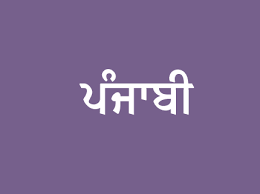Language/Panjabi/Grammar/Nouns
Hi Panjabi learners! 😊
In this lesson, we will learn about Panjabi nouns. We will discover how to identify them, the different types of nouns in Panjabi, their gender, number, and case.
Take some time to dive into these other pages after completing this lesson: Panjabi Grammar → Basic Sentence Structure → Subject-Object ..., Panjabi Grammar → Introduction to Panjabi Script → Gurmukhi ..., Emotions and Feelings & How to Use Be.
What is a noun?[edit | edit source]
A noun refers to a person, place, thing, or idea. In Panjabi, a noun is called "ਸਿੱਖ" (sikkh).
Example:
| Panjabi | Pronunciation | English |
|---|---|---|
| ਕਮਲ | kamal | Lotus |
In the example above, "ਕਮਲ" (kamal) is a noun that refers to a type of flower.
Types of Nouns[edit | edit source]
There are different types of nouns in Panjabi. Here are some examples:
ਵਾਕ || Vak - Common or Countable Nouns[edit | edit source]
Vak refers to common or countable nouns. These nouns can be singular or plural.
Examples:
- ਗਾਣਾ - Gaana (Song)
- ਕਿਤਾਬ - Kitaab (Book)
When we use a countable noun in a sentence, it takes different forms depending on whether it's in the singular or plural form. This is called "ਵਚਨ" (Vachan) in Panjabi.
Here's an example in the singular and plural form:
- "ਮੈਂ ਕਿਤਾਬ ਪੜਦਾ/ਪੜਦੀ ਹਾਂ ।" (Main kitaab pardaa/pardi haan.) - I am reading a book.
- "ਉਹਨਾਂ ਕਿਤਾਬਾਂ ਨੇ ਉਹਨੂੰ ਬਹੁਤ ਫਾਇਦਾ ਦਿੱਤਾ।" (Unhaan kitaabaan ne unno bahut faidaa dittaa.) - Those books gave them a lot of benefit.
ਅਸਾਧਾਰਣ ਵਾਕ || Asadharn Vak - Proper Nouns[edit | edit source]
Asadharn Vak refers to proper nouns. These nouns are specific and unique. In general, proper nouns in Panjabi are capitalized.
Examples:
- ਭਾਰਤ - Bharat (India)
- ਕੰਪਿਊਟਰ - Computer
When we use a proper noun in a sentence, it does not take different forms.
Example:
- "ਹਰਮਨ ਸਿੰਘ ਨੇ ਆਪਣੇ ਕੰਪਿਊਟਰ ਦੀ ਮਦਦ ਨਾਲ ਗਾਣਾ ਬਣਾਇਆ।" (Harman Singh ne aapne computer di madad naal gaanaa banaaya.) - Harman Singh made a song with the help of his computer.
ਨਾਇਕ || Naik - Abstract Nouns[edit | edit source]
Naik refers to abstract nouns. These nouns are intangible and refer to emotions, ideas or concepts.
Examples:
- ਪ੍ਰੀਤ - Preet (Love)
- ਆਪਣਾਪਣਾਂ - Apnapanaan (Belongingness)
When we use an abstract noun in a sentence, it does not take different forms.
Example:
- "ਮੈਂ ਨੇ ਆਪਣੇ ਪ੍ਰੀਤ ਦਾ ਇਜਹਾਰ ਕੀਤਾ।" (Mainne aapne preet da ijhaar kiita.) - I expressed my love.
Gender of Nouns[edit | edit source]
Nouns in Panjabi also have genders. They can be:
- ਪੁਲਿੰਗ || Puling - Masculine Gender
- ਸਤਰੀੰਗ || Strieng - Feminine Gender
Here are some examples:
| Panjabi | Pronunciation | English |
|---|---|---|
| ਮੁੰਡਾ | Munda | Boy (Masculine) |
| ਕੁੜੀ | Kudi | Girl (Feminine) |
| ਗੁਰੂ | Guru | Guru (Masculine) |
To identify the gender of a noun in Panjabi, we consider its ending. For example, nouns ending with "ਆਂ" (aan) are usually feminine, such as "ਕੁੜੀ" (kudi), which means girl.
Example conversation:
- ਕੀ ਤੁਸੀਂ ਕੁੜੀ ਹੋ? (Kee tusi kudi ho?) - Are you a girl?
- ਜੀ ਹਾਂ, ਮੈਂ ਇੱਕ ਕੁੜੀ ਹਾਂ। (Jee haa, main ik kudi haan.) - Yes, I am a girl.
Number of Nouns[edit | edit source]
We have already seen that in Panjabi, countable nouns can be singular or plural. Here's more detail:
- ਇਕ || Ik - One
- ਦੋ || Do - Two
- ਤਿੰਨ || Tinn - Three
- ਚਾਰ || Char - Four
- ਪੰਜ || Panj - Five
- ਛੇ || Chhe - Six
- ਸੱਤ || Satt - Seven
- ਅੱਠ || Att - Eight
- ਨੌਂ || Nau - Nine
- ਦਸ || Das - Ten
To make a noun plural, we add suffixes to the noun based on its ending.
Example:
| Singular | Plural |
|---|---|
| ਨਲ | ਨਲਾਂ |
In the example above, "ਨਲ" (nal) is masculine and singular, whereas "ਨਲਾਂ" (nalaan) is its plural form.
In general, masculine nouns that end with a consonant use "ਆਂ" (aan) suffix for the plural form. Feminine nouns that end with a consonant use "ਈਆਂ" (eeaan), and those that end with "ਆ" (aa) use "ਉਂ" (oon).
Example conversation:
- ਰਾਜਾਂ ਦਾ ਘਰ ਕਿੱਥੇ ਹੈ? (Rajaan da ghar kithhe hai?) - Where is the king's palace?
- ਰਾਜਾਂ ਦੇ ਘਰ ਵਿੱਚ ਹੈ। (Rajaan de ghar vich hai.) - It's inside the king's palace.
Cases of Nouns[edit | edit source]
Cases refer to the different forms a noun can take based on its function in a sentence. In Panjabi, there are ten cases for nouns.
Here are some examples:
| Case | Purpose | Example |
|---|---|---|
| ਇਹ | Nominative | This is a book |
| ਉਸ | Accusative | He read that book |
| ਉਸਨ | Ergative | He gave me a gift |
| ਉਸ | Vocative | Girl, are you learning Hindi? |
Example conversation:
- ਕੀ ਤੁਸੀਂ ਪੰਜਾਬੀ ਸਿੱਖਦੇ ਹੋ? (Kee tusi panjabi sikhde ho?) - Are you learning Panjabi?
- ਜੀ ਹਾਂ, ਮੈਂ ਪੰਜਾਬੀ ਸਿੱਖਦੀ ਹਾਂ। (Jee haa, main panjabi sikhdi haan.) - Yes, I am learning Panjabi.
To improve your Panjabi Grammar, you can also use the Polyglot Club website. Find native speakers and ask them any questions!
Sources[edit | edit source]
Other Lessons[edit | edit source]
- Questions
- Future Tense
- Plural
- Give your Opinion
- Negation
- Gender
- Adjectives
- Pronouns
- Conditional Mood

